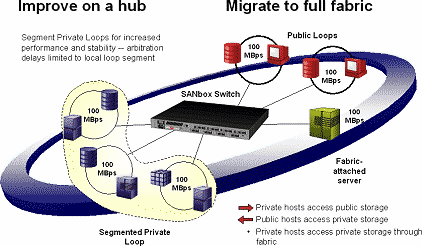SANbox FLS (Full Loop Support) describes a range
of features that allows QLogic switch products to facilitate high-performance transactions among the broadest variety of new and legacy Fibre Channel devices in the industry.
SANbox FLS helps IT managers leverage past infrastructure investments
by directly attaching their existing private loops and private loop
devices to a fully scalable switched fabric. Fabric-attached private
devices gain immediate performance, stability and fault
management benefits along with high-speed access to more advanced
public/fabric devices. No modification to the original private loop
interface or device drivers is required.

SANbox products enable private-to-private transactions (like a hub)
as well as full fabric/private bridging:
Private-to-private transactions
Because they allow private loops to be distributed over multiple
ports, SANbox switches offer a cost-effective way to replace hub-based
SANs with a more robust, scalable and high-performing infrastructure.
Unlike hubs, SANbox switches allow private loops to be divided
into multiple high-performance loop segments (see illustration
above). Each segment receives a full 100 MBps bandwidth without
having to contend with devices on other segments. "Segmented"
or "virtual" private loops may span some or all the
ports on a single switch -- or be distributed over the ports
of several switches in a multi-switch fabric.
Segmenting also enhances loop stability by confining LIPs and
other potential interruptions to the local segment, enabling greater
distance spans by maintaining higher signal integrity as devices
are added.
Fabric/private bridging (Translative Mode)
SANbox FLS offers the most comprehensive fabric/private bridging available. All combinations of fabric/public/private communications
are enabled, including
- Public initiator to or from a private target
- Private initiator to or from a public target
- Private initiator through fabric to or from a private target
on a different loop (Segmented Loop as described above)
QLogic's built-in name server automatically registers all devices
connected to the fabric and handles the address translation required
for mixed public/private transactions.